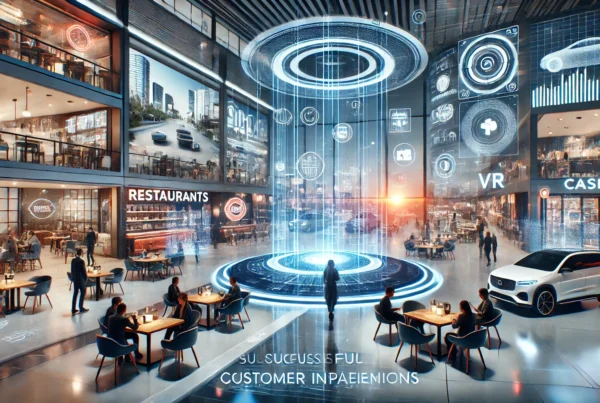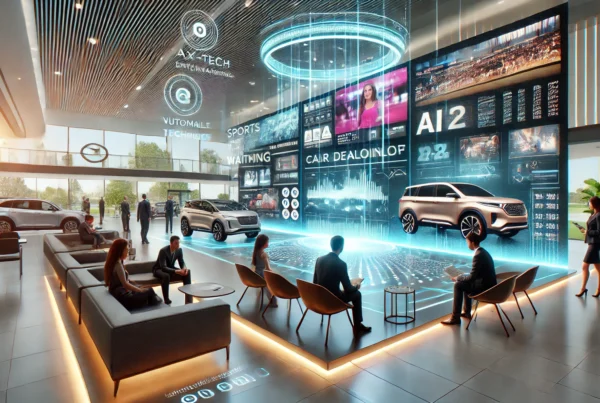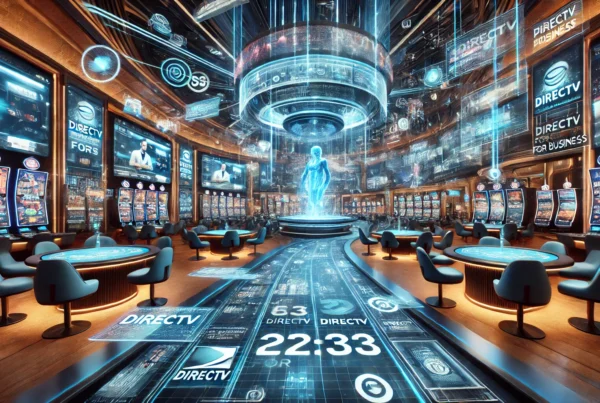In a world where customer expectations are constantly evolving, staying ahead of the curve in on-premise entertainment technology is crucial for businesses aiming to captivate and retain their audiences. Imagine walking into a bustling sports bar or a dynamic casino, where the atmosphere is energized by cutting-edge technology and immersive experiences. This isn’t a scene from a sci-fi movie but a glimpse into the future of how businesses engage with their clientele.
For business owners in industries such as hospitality, gaming, and automotive, understanding these future trends is vital. As consumer expectations rise, embracing innovations that enhance customer satisfaction and drive repeat visits becomes imperative. Technologies like virtual reality (VR) and artificial intelligence (AI) are not just enhancing engagement but also redefining how venues interact with their patrons, offering personalized and immersive experiences that are set to transform the entertainment landscape.
At Sports Direct, our mission is to provide exceptional video programming solutions that keep businesses at the forefront of these technological shifts. By exploring the dynamic world of on-premise entertainment technology, businesses can unlock new opportunities for growth and customer engagement. This blog post will delve into the most promising innovations set to revolutionize on-premise entertainment, such as augmented reality (AR) and big data analytics.
Are you ready to dive into the future and discover how these technologies can reshape your business model? Join us on this exciting journey as we uncover the potential of these advancements to create unforgettable experiences for your customers.
Virtual and Augmented Reality: Shaping Customer Experiences
In the rapidly evolving landscape of on-premise entertainment technology, virtual reality (VR) and augmented reality (AR) are at the forefront of innovation. These technologies are not just enhancing customer engagement; they are transforming how venues like sports bars and casinos interact with their patrons. By offering immersive experiences, VR and AR provide unique opportunities for businesses to captivate their audiences and foster deeper connections.
As the demand for more engaging and interactive experiences grows, the integration of VR and AR in on-premise settings becomes increasingly significant. According to a report by the International Association of Amusement Parks and Attractions, the market for immersive technology is projected to grow by 17% annually, highlighting the potential of these technologies to revolutionize customer engagement and drive repeat visits.
Successful Implementations of VR and AR
Virtual reality is transforming the way customers experience entertainment venues. By using VR headsets, guests can be transported to virtual worlds without leaving their seats. This technology is particularly impactful in sports bars and casinos, where it can simulate the excitement of a live sporting event or the thrill of a virtual casino floor. One successful implementation is the VR Zone in Tokyo, where visitors can engage in a variety of immersive experiences, from adrenaline-pumping adventures to serene explorations. This approach not only attracts a tech-savvy audience but also encourages longer visits and repeat patronage.
Augmented reality blends digital elements with the physical world, creating interactive and engaging environments. In the context of on-premise entertainment, AR can enhance live events by providing real-time information, such as player statistics or interactive game features, directly to a user’s device. Casinos and sports venues are leveraging AR to enrich the customer experience, offering interactive displays and real-time data that enhance the overall atmosphere.
Benefits and Challenges of Adopting VR and AR
While the benefits of VR and AR in on-premise entertainment are substantial, challenges must also be considered. On the plus side, these technologies offer unparalleled immersion and engagement, which can lead to increased customer satisfaction and loyalty. They also provide innovative ways to differentiate a venue from competitors, potentially attracting new demographics.
However, the adoption of VR and AR comes with its own set of challenges. High initial costs for equipment and software, the need for ongoing maintenance, and potential technical issues can pose significant hurdles. Additionally, ensuring a seamless and intuitive user experience is crucial, as any technical hiccups can detract from the overall experience. Despite these challenges, the potential rewards make VR and AR a worthwhile investment for businesses looking to stay ahead in the competitive landscape of on-premise entertainment.
Artificial Intelligence: Personalizing On-Premise Experiences
In the realm of Future Trends in On-Premise Entertainment Technology, artificial intelligence (AI) is emerging as a game-changer, revolutionizing how businesses engage with their customers. By harnessing the power of AI, venues can create personalized experiences that not only meet but exceed customer expectations. This transformative technology analyzes vast amounts of customer data to tailor interactions, promotions, and services, fostering enhanced engagement and loyalty.
AI’s ability to personalize on-premise experiences is reshaping how venues like sports bars, casinos, and even car dealerships interact with their patrons. By understanding individual preferences and behaviors, AI-driven tools enhance customer engagement and foster loyalty. Let’s explore the various applications of AI in on-premise settings, illustrating its impact through real-world examples and scenarios.
AI-Driven Personalization: Tailoring Experiences to Individual Preferences
One of the most significant advantages of AI in on-premise entertainment is its ability to personalize customer experiences. By analyzing data such as purchase history, browsing patterns, and social media interactions, AI can create highly customized experiences. For instance, AI-powered recommendation engines can suggest menu items, drinks, or entertainment options based on a customer’s past preferences.
In the hospitality industry, AI is used to tailor promotions and offers to individual guests. A sports bar might use AI to send personalized drink specials to patrons who frequently order certain beverages. Similarly, casinos can leverage AI to offer personalized gaming experiences, enhancing customer satisfaction and encouraging repeat visits. This level of customization not only delights customers but also builds a strong sense of brand loyalty.
Enhancing Customer Service with AI
AI is also revolutionizing customer service in on-premise settings. AI-powered chatbots and virtual assistants provide instant support, answering questions and resolving issues in real-time. This not only improves efficiency but also enhances the overall customer experience by providing quick and accurate responses.
For example, a car dealership might use an AI chatbot to assist customers with scheduling test drives or answering questions about vehicle features. In a casino, AI-driven virtual assistants can guide guests through gaming options or provide information on upcoming events. These applications not only streamline operations but also create a more personalized and engaging experience for customers.
Building Customer Loyalty Through AI
By offering personalized experiences and enhancing customer service, AI plays a crucial role in building customer loyalty. When customers feel understood and valued, they are more likely to return, leading to increased repeat visits and long-term loyalty. AI-driven loyalty programs can further enhance this by offering personalized rewards based on customer preferences and behaviors.
For instance, a loyalty program at a sports bar might use AI to offer exclusive discounts or early access to events for frequent patrons. By continuously analyzing customer data, AI can ensure that these rewards remain relevant and appealing, fostering a deeper connection between the business and its customers. This strategic use of AI not only enhances customer satisfaction but also drives business growth.
Sustainability in On-Premise Entertainment Technology
As the world becomes increasingly aware of environmental issues, sustainability is emerging as a key trend in on-premise entertainment technology. Businesses are recognizing the importance of adopting eco-friendly practices not only to appeal to environmentally conscious consumers but also to reduce operational costs. By integrating sustainable technologies and practices, venues can enhance their brand reputation while contributing positively to the environment.
Incorporating sustainability into on-premise entertainment involves a range of strategies, from using energy-efficient systems to adopting renewable energy sources. These efforts not only help in minimizing the carbon footprint but also offer significant cost savings in the long run. Let’s explore how businesses are successfully implementing these sustainable practices.
Energy-Efficient Technologies: Reducing Consumption
One of the primary ways businesses are enhancing sustainability is through the adoption of energy-efficient technologies. By upgrading to LED lighting, installing smart thermostats, and utilizing energy-efficient appliances, venues can significantly reduce their energy consumption. These technologies not only lower electricity bills but also contribute to a more sustainable operation.
For instance, many casinos and sports bars are replacing traditional lighting with LED systems, which consume up to 75% less energy and last 25 times longer than incandescent bulbs. This shift not only reduces energy costs but also aligns with consumer expectations for environmentally responsible business practices.
Renewable Energy Sources: Harnessing Natural Power
Another impactful approach to sustainability is the use of renewable energy sources. Solar panels and wind turbines are becoming increasingly popular in on-premise entertainment venues, providing clean and sustainable energy. By harnessing natural power, businesses can reduce their reliance on fossil fuels and lower their carbon emissions.
A notable example is a sports complex in California that has installed solar panels to power its operations. This initiative not only demonstrates a commitment to sustainability but also results in significant cost savings on energy bills. Such efforts are crucial in setting a precedent for other businesses to follow.
Waste Reduction Initiatives: Minimizing Environmental Impact
In addition to energy efficiency and renewable energy, waste reduction is a critical component of sustainability. By implementing recycling programs, reducing single-use plastics, and promoting digital tickets over paper ones, venues can minimize their environmental impact.
Many entertainment venues are now offering digital menus and tickets, reducing the need for paper and plastic waste. This shift not only supports environmental sustainability but also enhances the customer experience by offering more convenient and hygienic options.
Embracing the Future of On-Premise Entertainment
As we navigate the evolving landscape of Future Trends in On-Premise Entertainment Technology, it’s clear that integrating innovations like VR, AI, and sustainable practices is not just beneficial but essential for businesses aiming to thrive. These advancements offer unique opportunities to differentiate your venue and create immersive and personalized experiences that captivate your audience.
Virtual and augmented reality have transformed customer engagement by providing thrilling and interactive experiences in venues such as sports bars and casinos. These technologies allow patrons to step into virtual worlds or enhance real-world interactions, offering a unique blend of excitement and engagement. Meanwhile, artificial intelligence is revolutionizing personalization, enabling businesses to tailor experiences based on individual preferences, thus fostering customer loyalty and satisfaction.
Sustainability is also becoming a key pillar in the future of on-premise entertainment. By adopting eco-friendly practices and technologies, businesses can reduce their carbon footprint, appeal to environmentally conscious consumers, and achieve cost savings. Implementing energy-efficient systems, renewable energy sources, and waste reduction initiatives not only benefits the environment but also enhances brand reputation.
- Integrate Emerging Technologies: Utilize VR, AR, and AI to create immersive and personalized experiences.
- Prioritize Sustainability: Implement eco-friendly practices to appeal to environmentally conscious consumers and reduce operational costs.
- Leverage Data: Use big data and AI to personalize customer interactions and enhance the overall experience.
We invite you to explore more about these trends and how they can be integrated into your business strategy by visiting Sports Direct. Share your thoughts and experiences in the comments below. How do you envision the future of on-premise entertainment? Join the conversation and help shape the future of this dynamic industry.








